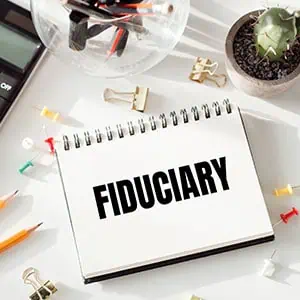
Fiduciary relationships are founded on trust, loyalty, and a duty to act in another’s best interests. When that trust is violated, the consequences, both legal and financial, can be severe. In Louisiana, the laws surrounding fiduciary duty are nuanced and can vary depending on the nature of the relationship.
In this article, we’ll explain…
A fiduciary duty is a legal responsibility to act in someone else’s best interest with honesty, loyalty, and full disclosure. The many legal fiduciary obligations in Louisiana often exist within relationships such as attorney-client, trustee-beneficiary, or business partnerships.
A breach occurs when the fiduciary puts their own interests ahead of yours. This can show itself as them misusing funds, making secret deals, or hiding conflicts of interest. In Louisiana, even careless or passive behavior, such as failing to communicate critical information, can constitute a breach if it causes harm to the person relying on the fiduciary’s guidance.
When this happens, pursuing a breach of duty lawsuit in Louisiana may be necessary to recover damages and hold the responsible party accountable.
To prove a breach in Louisiana, you’ll need to establish three key elements:
Evidence in these cases often includes contracts, financial records, email communications, or testimony showing that decisions were made without your consent or against your interests. In some cases, expert witnesses may be called to explain industry standards and show how the fiduciary’s actions fell short of those standards.
Many people throughout Louisiana don’t realize that everyday actions by professionals or partners may indeed qualify as fiduciary breaches. Common but overlooked examples include:
Even poor record keeping or explained delays in sharing information could signal a breach. These actions may appear routine but actually violate the duty to act transparently and in your best interest, which Louisiana law takes quite seriously.
Some warning signs that a lawyer has breached their fiduciary duty include:
If your lawyer avoids answering your questions, acts in ways that clearly benefit them over you, or fails to communicate major developments in your case, consider these red flags.
In more serious cases, breaches include representing multiple clients with conflicting interests without proper disclosure of those interests. If you feel like your attorney is hiding information or not prioritizing your goals, it may be time to investigate whether a fiduciary duty has been breached.
Victims of a fiduciary breach in Louisiana can recover various types of damages. These typically include direct financial losses, such as money improperly taken or misused, and losses caused by missed opportunities or poor advice. In some cases, you can also seek disgorgement, which forces the fiduciary to give up any profits they gained from their misconduct.
If the breach was intentional or particularly harmful, Louisiana courts may award punitive damages to punish the wrongdoer and deter future misconduct. Attorney’s fees may also be recoverable depending on the circumstances.
If you believe a fiduciary, whether a lawyer, business partner, or trustee, has violated your trust, gather as much documentation as possible. This includes contracts, financial statements, communications, and records of questionable behavior.
Avoid confronting the person directly, as this can lead to further complications. Instead, contact an experienced fiduciary duty attorney who can evaluate your situation, identify your legal options, and take appropriate steps to protect your interests. Prompt action will go far to help preserve evidence and strengthen your case further down the road.
In Louisiana, breach of fiduciary duty claims are subject to a strict one-year prescriptive period, beginning from the date the victim knew or should have known about the breach. This timeline can be extended in certain cases where the misconduct was concealed, but courts typically enforce this deadline fairly strictly. Waiting too long can result in losing your right to seek compensation. If you suspect a breach, it’s vital you speak with an attorney right away to avoid missing any key deadline.